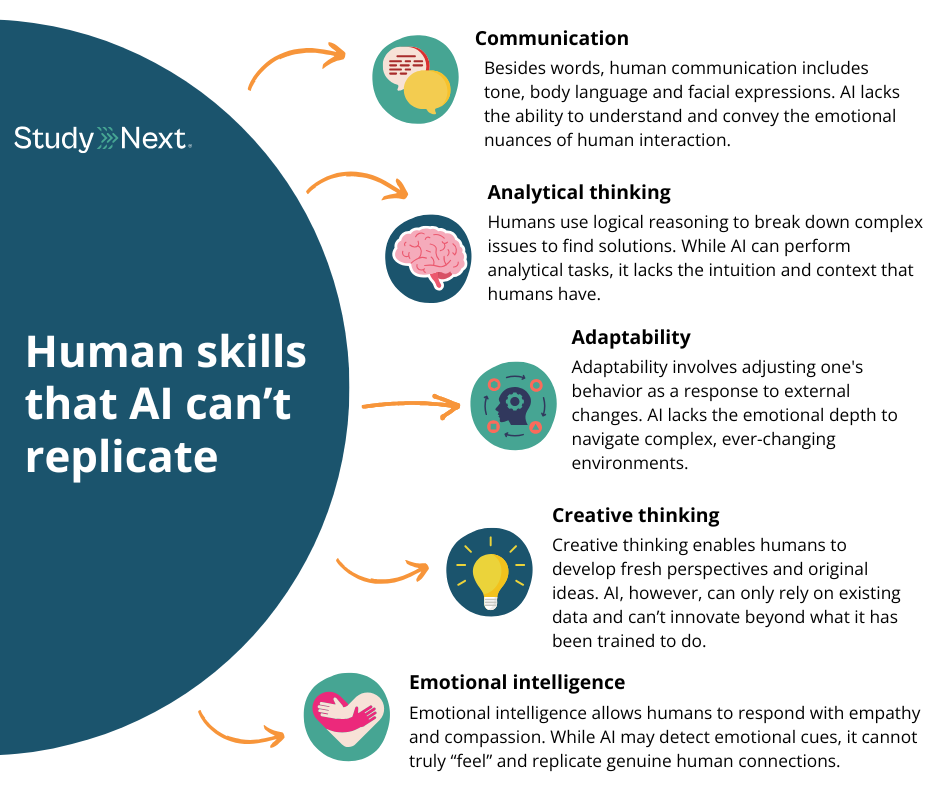
While artificial intelligence (AI) offers exciting opportunities to streamline workflows and boost operational efficiency, it also raises concerns about potential job displacement. Whether you’re just entering the job market or already progressing in your career, it’s valuable to explore career paths that offer strong job security in today’s digital climate.
This article examines AI’s impact on the Australian workforce and highlights business careers that are less likely to be affected by this technological shift, as they continue to rely on human skills that can’t be replicated by AI.
AI impact on jobs: key findings from research
Research shows that AI is rapidly transforming how we work and the nature of our jobs. Roles that involve repetitive tasks are increasingly being streamlined by machines, reshaping the skills needed in today’s workforce. This disruption is highlighted in the Future of Jobs report published by the World Economic Forum (WEF) in 2025, which revealed that 40 per cent of employers worldwide expect to reduce their workforce in areas where tasks can be automated by AI. WEF also found that while AI and technological trends are predicted to create 11 million jobs, they’re also expected to displace a significant nine million roles.
In Australia, the Social Policy Group predicts in its 2024 Artificial Intelligence and the Great Retrenchment report that if AI adoption continues at its current pace, one-third of the workforce could face a period of unemployment by 2030. Even if the adoption rate slows down, one in five working Australians may still experience job loss.
These projections naturally raise concerns among workers about whether AI could phase them out of their roles. As automation becomes more prevalent across industries, many are questioning the long-term stability of their careers and how their skills will remain relevant in an increasingly AI-driven world. According to Ipsos’s AI at Work report in 2024, Australian workers have mixed feelings about this emerging technology. While four in 10 employees believe AI will make their work more efficient, a similar proportion are also concerned about job security.
Will business jobs be replaced by AI?
While some jobs, especially those involving routine or repetitive tasks, may risk getting replaced, there are many business roles that remain resilient amidst this technological shift. These jobs require uniquely human expertise that can’t be automated by machines. While leveraging AI in business can boost efficiency and performance, they work best as a complementary tool for these business professionals instead of replacing them. This demonstrates the enduring value that human-centric roles have in the AI-powered business landscape.
What are uniquely human skills that AI can’t replicate?
AI lacks the depth of intelligence and insight that only humans have from their lived experiences. Although it can be a powerful tool to enhance work efficiency, there are still many qualities that can’t be replicated by machines, such as the following:

5 types of business jobs that AI can’t replace
AI can’t replace business roles that require inherently human skills, including C-suite executives, managers, client-facing professionals, human resource (HR) executives and brand management teams. Find out what these roles usually entail, why they can’t be automated and how much they typically earn, according to SEEK:
C-suite roles
C-suite roles are the highest-ranking executive positions in an organisation, providing strategic leadership to guide the company’s long-term direction. Depending on their role, they oversee core functions such as finance, marketing, operations and technology, ensuring departments are aligned and working towards reaching business goals. C-suite executives are known for their deep expertise and industry experience, allowing them to make critical decisions, tackle complex challenges, manage risks and navigate the company in a competitive business environment.
Becoming a C-level professional typically involves a combination of advanced academic qualifications, networking and substantial leadership experience. Throughout their career, they forge their skills in strategic planning, critical thinking and business acumen, which can’t be replicated by AI. Besides driving performance, C-suites also engage with major stakeholders and are accountable for high-stakes decisions that shape the company’s future. While AI can support decision-making with data, it can’t replace the vision and human insight required to lead an organisation at the highest level.
Examples of C-suite roles and their average annual salaries:
- Chief executive officer: $190,000 to $210,000
- Chief financial officer: $195,000 to $215,000
- Chief operating officer: $200,000 to $220,000
- Chief technology officer: $200,000 to $220,000
- Chief information officer: $180,000 to $200,000
A C-level executive typically holds an advanced degree, such as a Master of Business Administration (MBA), which complements their extensive years of industry experience. Many MBAs include components that can help them navigate their business effectively in an increasingly digital world. For example, the University of Adelaide’s Master of Business Administration course includes the eTech Challenge unit, which focuses on technological innovation with a particular emphasis on product design. You’ll learn how to develop prototypes that respond to market needs.
The Master of Business Administration (Leadership and Enterprise) course at the University of Sydney features the Leading in a Digital World unit, which teaches you how to analyse modern technological trends and their implications towards managers, employees, companies and society as a whole. Some of the topics covered in this unit include big data, digital disruption and transformation, the future of work and AI.


This program will equip you with the mastery of complex leadership concepts and skills-from identifying technical and human challenges, to mobilising collaborative action in different cultures and environments.
Develop highly advanced strategic thinking skills-the ability to see the bigger commercial and societal picture and make decisions with a truly global outlook. Gain high-level problem-solving, research and analysis, critical thinking and self-reflection skills. You'll also acquire outstanding management capabilities in critical business functions, including finance, accounting, economics, marketing and business law.
In the course, you will partner with an experienced industry mentor to plan and develop a sustainable entrepreneurial enterprise through the Australian eChallenge or Tech eChallenge. You can build extensive professional relationships and networks.


The Master of Business Administration (Leadership and Enterprise) is a postgraduate coursework degree that will develop your business knowledge, critical thinking, problem-solving, analytical and communication skills.
You will complete core units in personal and interpersonal skill development, business knowledge and skill development, and building future enterprises, along with a design-led strategy capstone unit.
This full-time MBA is taught over 18 months and has a precise limit on class size. The program is delivered in an intensive format where students complete two units of study at a time over a seven-to-eight-week period.
Management roles
Management roles are positions within a company with the primary responsibility of managing projects and teams. Common manager responsibilities include hiring and training staff members, delegating tasks efficiently, managing departmental budgets and conducting performance reviews. Their authority and scope of duties often depend on their management level, as lower-level managers would usually supervise employees directly while high-level managers may be involved in strategic planning and key business decisions. Managers play a vital role in ensuring the business runs smoothly as they oversee daily operations and keep projects aligned with business goals.
Managers require a combination of human-focused skills that AI can’t copy, such as emotional intelligence and interpersonal skills. As they work with employees closely, they need to navigate team dynamics, resolve conflicts and inspire members to work at their best. AI lacks this kind of authentic empathy and can’t make decisions that factor in human behaviour and company culture.
Examples of management roles and their average annual salaries:
- General manager: $150,000 to $170,000
- Project manager: $135,000 to $155,000
- Risk manager: $130,000 to $150,000
- Finance manager: $125,000 to $145,000
- Operations manager: $105,000 to $125,000
If you’re planning to pursue postgraduate studies in management, you can explore courses that can help enhance your digital literacy. Victoria University (VU)’s Master of Management course, for instance, has the Data Analysis for Business unit, which can help you gain skills in interpreting data to derive meaningful insights that can inform decision-making. In this unit, you’ll explore fundamental techniques in data visualisation, collection and processing.
Meanwhile, the Master of Management at the University of the Sunshine Coast (USC) includes the Business Transformation through Technology and Artificial Intelligence unit. It’s designed to provide future leaders with crucial insights to manage modern technological solutions within businesses. The unit delves into the managerial and technical aspects of adopting emerging technologies, as well as their practical application and ethical implications.


Launch your career in management with VU's Master of Management. This business masters course will help you make a confident step towards a senior role in business or the public sector. You will develop your strategic thinking, leadership, and negotiation skills.


The Master of Management provides a strong foundation across all areas of contemporary management, including strategy, leadership, marketing, informatics and project management.
This degree will help you improve your ability to evaluate business decision-making through real-world business problems and case studies, and develop your skills in managing people and teams. Hone your knowledge through a range of specialist courses in entrepreneurship and innovation, health sector management, supply chain management, international business and more.
Client-facing roles
Client-facing jobs are positions where employees engage with customers or clients directly, whether through face-to-face meetings, phone calls, emails, live chat or video calls. Common examples of these roles include customer service representatives, account managers and sales representatives. They serve as the primary point of contact for communication between a business and its targeted audience. Client-facing functions are vital as they seek to understand customer needs, solve their issues and build trust with them. When customers have a positive experience, it can lead to long-term loyalty and enhanced brand reputation.
AI can’t replace those working in client-facing jobs as they involve business communication that relies heavily on emotional intelligence, contextual awareness and personalised problem-solving. Building strong client relationships also requires active listening, empathy and the capacity to understand individual needs. Every customer is unique and often requires a customised approach that goes beyond AI-generated solutions. While AI can support basic enquiries, it can’t connect with customers meaningfully as it lacks emotional sensitivity. This is why customers and clients typically prefer interacting with humans rather than machines to receive tailored solutions for their problems.
Examples of client-facing roles and their average annual salaries:
- Financial planner: $125,000 to $145,000
- Customer success manager: $95,000 to $115,000
- Account manager: $85,000 to $105,000
- Business development executive: $75,000 to $95,000
- Sales representative: $75,000 to $95,000
Human resources roles
Human resources (HR) is an essential function in nearly every business across industries and is responsible for managing and supporting the workforce. This involves recruiting talent, managing employee benefits, organising employee development programs and building a safe and positive workplace culture. HR professionals ensure an organisation is staffed with individuals who have the right qualifications and skills to perform their duties. They’re also involved in developing and implementing company policies in a wide range of areas, such as dress codes, leave entitlements and ethics codes of conduct. HR functions help businesses to succeed and grow by building a productive and motivated workforce.
HR roles thrive on humanising businesses as they focus on employee welfare and development. This requires empathy, relationship management and a nuanced understanding of what employees and businesses need, which AI lacks. While AI can help streamline HR tasks, there are still many critical jobs AI can’t do, including resolving workplace conflicts and managing employee relations. HR professionals also navigate ethical dilemmas in businesses, which require compassion and human judgment beyond AI’s capabilities.
Examples of HR roles and their average annual salaries:
- Human resources manager: $120,000 to $140,000
- Recruitment manager: $120,000 to $135,000
- Human resources advisor: $90,000 to $105,000
- Training officer: $80,000 to $100,000
- Human resources coordinator: $75,000 to $90,000
As a response to the increasing demand for talent with digital skills, many postgraduate HR courses incorporate digital-based units in their curriculum to prepare graduates for the modern workforce. For example, one of the units in RMIT University’s Master of Human Resource Management is Predictive Human Resource Analytics, which equips you with the skills to leverage data to make better strategies in addressing workforce problems in domestic and global settings. The unit will also teach you how to interpret findings from people-related data to anticipate the behaviours of existing and potential employees.
The Master of Human Resources Management course at Murdoch University includes the Data, Metrics, Reporting and Analytics unit, which focuses on how HR data and metrics can be harnessed to develop effective HR policies that align with strategic organisational objectives. You’ll learn topics such as descriptive HR analytics, data visualisation and predictive HR analytics.


The Master of Human Resource Management is designed for those who want to become strategic leaders in the world of work, shaping organisational success through effective people management. This isn’t just about understanding policies – it’s about becoming an expert in navigating the complex, ever-changing landscape of talent and culture within organisations.
You’ll dive into the heart of HR with courses that explore the latest in strategic HR practices, people analytics and the global challenges faced by HR professionals today. From mastering the skills that define an outstanding HR leader to understanding the legal frameworks that guide employment relationships, this program will arm you with both the knowledge and the tools to make a real impact.
You’ll explore how organisations can harness the power of diversity, create high-performance cultures and lead people through times of transformation. Whether you’re aiming to build a career in HR leadership or becoming a trusted HR consultant, this program will help you develop the practical skills and strategic mindset to drive both people and business success in today’s fast-paced, global workforce.


This coursework master's degree will allow you to plan and manage an organisation’s teams in ways which align with the organisation’s strategic goals and objectives. You’ll explore what makes a productive and sustainable workplace culture as you apply the new technologies and innovative HR solutions you learn.
Creative and brand management roles
Creative and brand management roles are responsible for the perception of an organisation among customers, clients and the general public. Professionals in these roles ensure that their company’s products and services answer consumer needs and develop strategies to boost the overall brand image in the market. They manage the development and execution of marketing campaigns and brand strategies on all channels. These roles are important as they influence how a business is perceived by its audience and the wider community. They help drive engagement among customers, which can lead to brand loyalty and enhanced business performance.
Despite concerns that generative AI (GenAI) could replace creative roles in business, human creatives are still very much necessary for their insight, cultural sensitivity and strategic thinking that transcends computer-generated outputs. While GenAI tools can support content creation and ideation, they can only rely on data instead of lived human experiences. Building a brand’s image requires you to resonate with human emotions and consider societal and cultural sensitivities. AI can’t make intuitive decisions like humans and replace the originality and creativity needed to develop a compelling brand narrative.
Examples of creative and brand management roles and their average annual salaries:
- Creative director: $160,000 to $175,000
- Creative manager: $105,000 to $115,000
- Brand manager: $100,000 to $120,000
- Marketing executive: $80,000 to $95,000
- Brand specialist: $65,000 to $85,000
Brand management is a crucial function within a company’s marketing strategy. You can find plenty of postgraduate marketing courses that include units specifically designed to boost your digital expertise. Griffith University’s Master of Marketing, for example, has the Digital Marketing and AI unit, which focuses on the advantages of an integrated marketing plan that combines both new and traditional methods. You’ll learn essential digital marketing concepts and how they can be used to examine and influence consumer behaviour in today’s digital world.
One of the units featured in Deakin University’s Master of Business (Marketing) is Fundamentals of MarTech. Offering an overview of the future of marketing technology (MarTech), this unit explores various marketing data requirements and teaches you how to apply the most appropriate MarTech solutions to diverse marketing areas, including customer engagement and relationship management.


Marketing is fast-paced, exciting and always challenging. It is an ideal career if you are creative, analytical and a good communicator. You will gain a solid base of knowledge and expertise in the latest techniques and technologies in consumer behaviour, market research and integrated marketing communications.
The Master of Marketing program builds on this foundation, where you will learn advanced marketing principles, best practice and new approaches to build customer relationships. Your studies will enable you to think strategically about value, positioning and competitive advantage in a global context through branding and digital marketing applications.
Griffith University offers a number of study options for Marketing including on-campus and online.


Develop the specialised skills to create a thriving and dynamic marketing career? Build your expertise and learn how to grow brands at one of Victoria's top 3 business schools with Deakin’s Master of Business (Marketing).
You will gain in-demand, contemporary marketing knowledge and sharpen your communication and critical thinking skills, which employers are looking for. Experience hands-on practical learning across martech, digital and social media marketing, marketing analytics and sustainability for business, allowing you to develop contemporary marketing knowledge that will set you apart in the industry.
Learn how to develop, implement and evaluate effective marketing strategies and put your skills into practice with industry-relevant learning opportunities. Throughout your degree, you will gain practical experience through case studies and client-based projects and graduate with the confidence and skills to thrive.
You will have the opportunity to specialise in another area of business or take a variety of subjects to enhance your business skills further. Tailor the course to meet your interests, creative ambitions and career goals.
Learn from expert academics and teachers at the top of their fields and guest lecturers from a wide range of industries who will use their career expertise to demonstrate how to apply theory in an organisational context.
You will have opportunities to network with like-minded professionals and build valuable industry connections. The Master of Business (Marketing) is accredited by the Australian Marketing Institute (AMI).
Stay ahead digitally with AI short courses
If you don’t have the capacity to pursue a postgraduate degree, taking an AI short course is a great way to upskill your digital literacy without the time and financial commitment that a traditional degree requires. Australian providers offer a range of flexible and self-paced short courses, allowing you to balance learning with your personal and professional obligations. Many short courses are also beginner-friendly, making them accessible to professionals across diverse industries.
AI short courses typically offer targeted learning, which allows you to choose a course that aligns with your learning goals. For example, the online AI for Organisational Innovation course at the University of New South Wales (UNSW) aims to help you understand how AI can be integrated into business processes and how to lead an AI project from start to finish. You’ll also learn the possible risks of implementing AI and how to build strategies to manage them. Delivered over three weeks, the course includes live sessions conducted by an industry expert.
If you’re interested in GenAI, the University of Melbourne offers the in-person Generative AI for Business short course. In this course, you’ll gain an understanding of how to incorporate GenAI into your business objectives as an opportunity for organisational growth. This includes learning how to identify investment opportunities and how to develop plans to ensure ethical AI application and its long-term value.
If you would like to explore machine learning (ML), you can take the Applied Machine Learning course at the University of Queensland (UQ) to obtain fundamental knowledge of core ML concepts and techniques. You’ll learn how to interpret ML results and how to apply the technology to tackle organisational challenges and make better-informed decisions. Understanding the language of ML also allows you to interact with technical teams confidently and deliver insights to stakeholders.


AI is reshaping organisations at an unprecedented pace. From automating routine tasks to powering groundbreaking innovations, AI is driving efficiency, improving decision-making and creating new opportunities. By increasing your AI literacy, you can be part of the digital transformation. Whether you are in marketing, finance or even operations, AI skills will empower you to make data-driven decisions, increase productivity and even drive innovation.
Throughout this course, you will discover how AI operates and how it can be best leveraged - from understanding generative AI and its limitations to mastering prompt engineering. You will gain practical insights and strategies for harnessing AI’s potential effectively and ethically at work and develop a practical action plan for implementing AI within your role. This requires leveraging a range of strategies for selecting and implementing the right AI tools for your role to stay ahead in the AI-driven world.
- Delivered 100% online.
- Participate in live sessions facilitated by an industry expert.
- Receive a digital badge and 2.00 CEMD points.


Utilise Generative AI to drive growth, innovation, and a competitive edge.
65% of organisations are already regularly using Generative AI in at least one business function (McKinsey, 2024).
Used wisely, Generative AI has the potential to drive growth, nurture innovation and provide your organisation with a competitive edge.
Led by top educators from Melbourne Business School and the University of Melbourne, develop a deeper understanding of the fundamentals of Generative AI to unlock innovative applications and address the associated risks.
At the completion of the program, you will have your own practical business strategy that outlines how to integrate Generative AI with your broader business goals, ideas for where to invest, and execution plans to ensure its responsible use and long-term value.
Join the two-day program to discover the tools, and technologies to better harness the power of Generative AI in your business.


Harness the potential of machine learning (ML) to drive innovation and informed decision-making in your organisation. Specifically designed for non-technical professionals, this course simplifies complex ML concepts and equips you with the skills to evaluate and apply ML outcomes effectively.
From managing large datasets to working with text, audio or image data or collaborating with data experts, this program provides actionable insights to help you unlock ML’s value. Discover how to identify key opportunities, interpret results and leverage ML to gain a competitive edge in today’s data-driven world.
Future-proof your career with further study
Whether you’re a recent graduate or a working professional thinking about your next career move, job security is an important factor to consider, especially in an increasingly AI-powered business landscape. It’s important to boost your digital literacy so you can not only keep up, but also get ahead in the competitive job market. Furthering your studies can help you gain the skills you need. Start your journey today by exploring diverse postgraduate business courses and AI short courses available in Australia.























